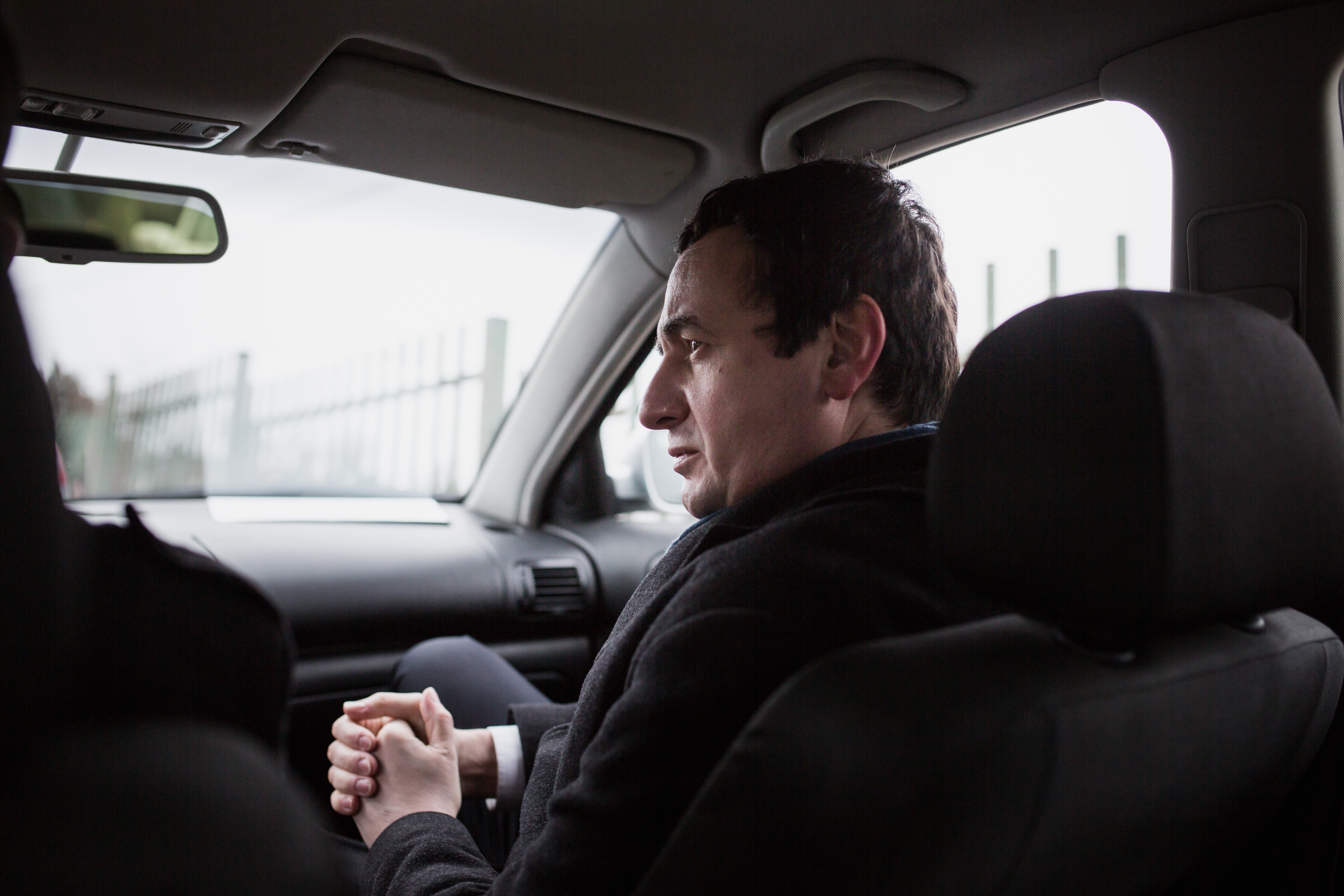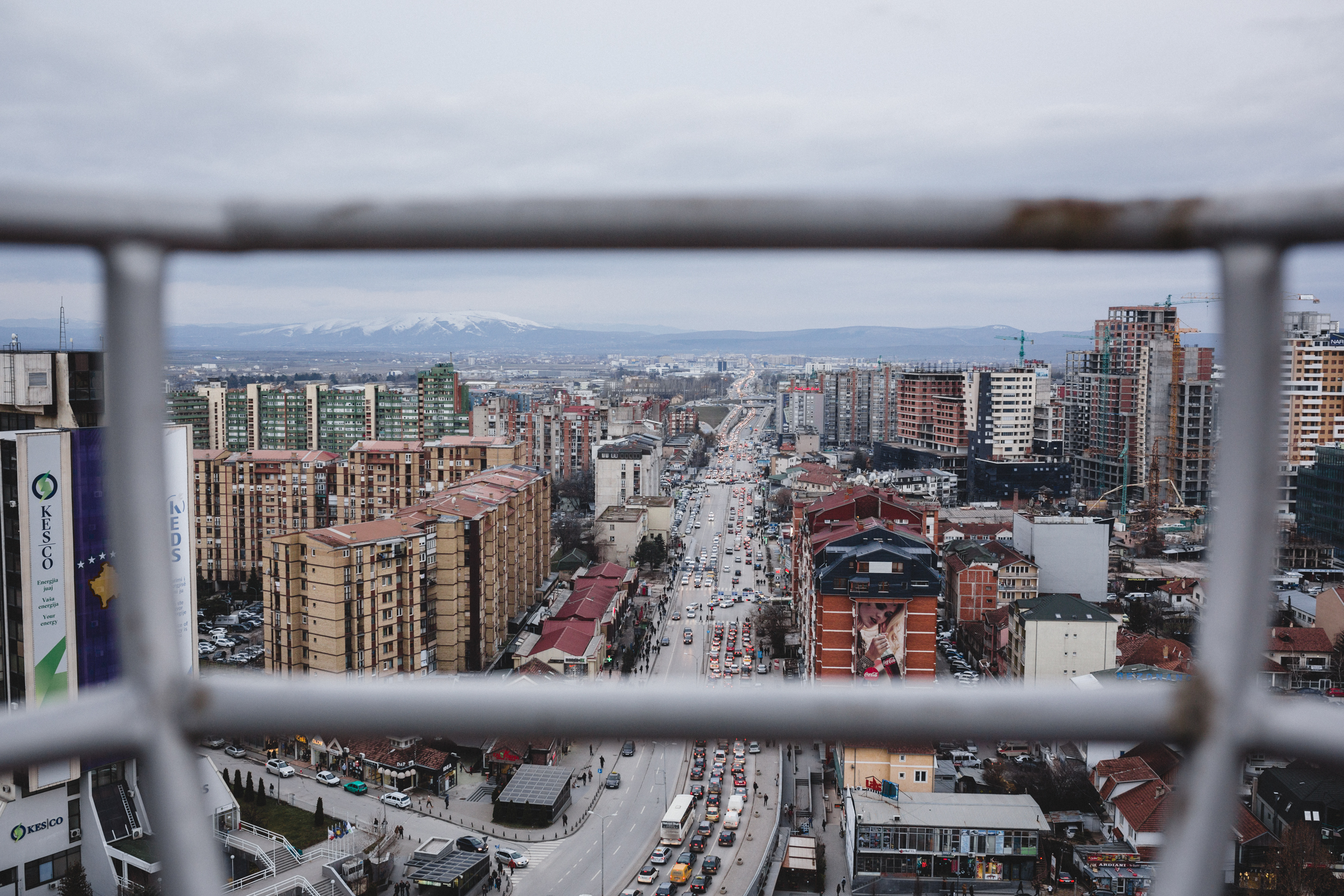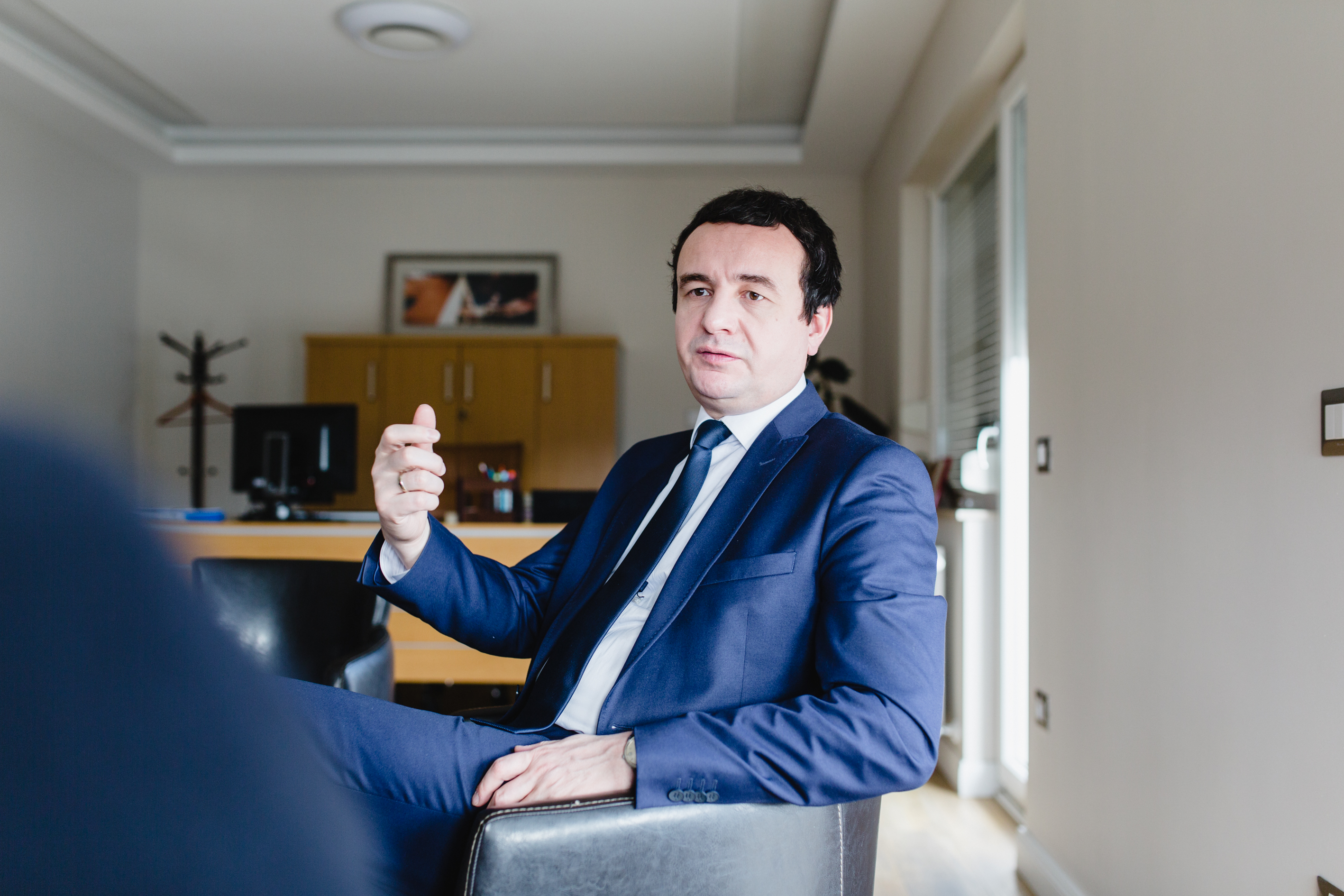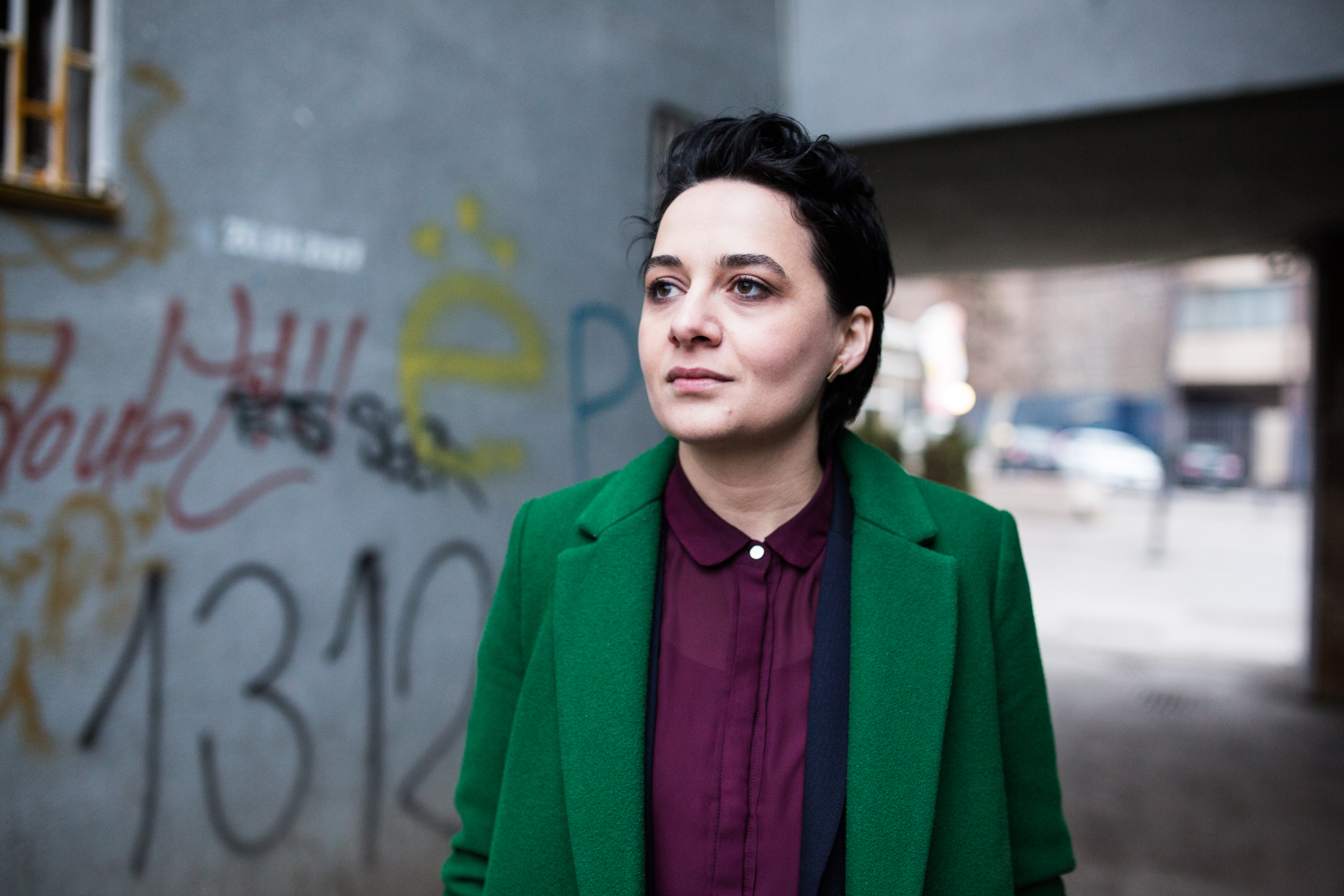29 March 2018
Originally published
16 February 2018
Source
It took only a few years for Vetëvendosje to become Kosovo’s strongest force. Now that joining the government is within its reach, its delegates are completely at odds. A look at the flight and fall of a left-wing nationalist movement.
As we drive along, we pass by unplastered brick houses and concrete skeletons. Most of them do not have a fence, driveway or backyard. They are located on fields and meadows near the main road, which is lined with one car repair shop after the other. The man looking out of the window, lost in thought, loves to invent ornate metaphors. Many years ago, when he was a student with long shaggy locks and wearing chequered flannel shirts, things were different. Back then he used to shout slogans into a megaphone, the bolder the better, his brow creased with frown lines. Today, he prefers to wear slim fit suits like Canadian Prime Minister Justin Trudeau and France’s President Emmanuel Macron. His hair is short with a few white strands. The former rebel now has the air of a statesman. When he talks, he takes lengthy pauses between phrases to appear contemplative and philosophical. He cites Judith Butler and Sigmund Freud. Albin Kurti, Kosovo’s loudest opposition member, does not holler, he whispers his sentences as if they were fragile. “These houses out there,” says Kurti, “symbolise the entire country. We have a roof and a foundation, but something’s missing in between.”

On the way to a memorial service, Albin Kurti looks thoughtfully out the window. He talks about the “party’s worst crisis since its formation”. Photo: © Martin Valentin Fuchs.
Albin Kurti heads a party that has managed to become Kosovo’s strongest force within just a few years. The party’s name speaks for itself: Vetëvendosje means self-determination. Founded in 2004 by Kurti, the movement aims to be citizen-oriented, down-to-earth and anti-elitist. Many of its supporters are students who are disillusioned with the corrupt elite that has governed Kosovo since the end of the war in 1999. Precisely ten years ago, Kosovo, a Balkan country with a population of 1.8 million, declared its independence from Serbia of which it had been a province in the former Federal Republic of Yugoslavia. Kosovo is predominantly populated by Albanians and in the late nineties it was torn apart by a bloody war that was ended by NATO air strikes. Although Kosovo is teeming with foreign soldiers, judges and prosecutors, and although thousands of non-governmental organisations have sprung up like mushrooms since the war, it remains the poorest country in the Western Balkans. Today, many citizens wonder about the whereabouts of billions of euros in aid money. Vast sums disappeared into the pockets of corrupt politicians and their respective clientele, prompting opposition leader Kurti to call the ruling parties “thieves”. He describes the international community that promised to lead the country to a better future as “colonial rulers”. And he compares neighbouring Serbia, which has not recognised Kosovo to this day, to an “octopus” that uses its tentacles to probe deep into his country.

View of Pristina from the tower of the Mother Teresa Cathedral. The cityscape is characterized by rapid growth and illegal construction activities, resulting in a jumbled assortment of houses. Photo: © Martin Valentin Fuchs.
These kinds of populist metaphors helped Kurti become Kosovo’s most voted for politician. Actually, he could have become prime minister. However, after coalition talks foundered, a party alliance (AAK, PDK, Nisma) made up of former rebel leaders – also called the “war faction” – only just managed to scrape together a narrow government majority. In the end, Vetëvendosje – the party with the most votes – remained in opposition. The “war faction” formed a government of 17 parties, 22 ministers and 70 deputy ministers. This bloated administration is basically the best thing that could have happened to Vetëvendosje, since its supporters had always called for a lean state. But now, of all times, when Vetëvendosje should be patting itself on the back, the movement has started to crumble. The number of members leaving the party is increasing, Pristina’s mayor Shpend Ahmeti being the most recent example. He was considered one of the country’s most respected politicians. To date, Vetëvendosje has lost almost half of its delegates. Its 32 seats in parliament have shrunk to 19. All of this happened in less than two months.
It is currently still not possible to say why so many delegates are leaving and when they will decide to found their own parties. However, political scientist Albert Krasniqi of the Kosovo Democratic Institute (KDI) said that all of these resignations had one thing in common. “They all accuse Albin Kurti of an autocratic leadership style,” says Krasniqi. Arber Zaimi, media spokesman for Vetëvendosje, denies these allegations: “These resignations are not about substantial criticism of the movement, they are about power games. Vetëvendosje has never disqualified or suppressed dissenting opinions.” A month ago, Albin Kurti himself talked about the “party’s worst crisis since its formation”. At the time, there was still a note of hope in his voice that those who had resigned might return.
“You cannot import democracy”
A few days prior to Kosovo’s tenth independence celebrations on 17 February, Kurti was standing by the window of his office, located in the diplomatic quarter of the capital of Pristina. It is as understated as his new suit-clad look: a tidy desk, a glass table with leather chairs, a coffee machine on the floor, plugged into the wall socket. His hands pushed deep into his trouser pockets, Kurti said – as pensively as ever: “I don’t believe that you can build up a state from the outside. You cannot import democracy.” In Kosovo there is no other politician who attacks the European Union as fiercely as Kurti. In 2008 the EU set up its rule-of-law mission EULEX in Kosovo to clean up corruption and today, ten years later, has come under suspicion of corruption itself. This has severely damaged the image of the EU. And it has boosted Kurti’s reputation, who has always pursued policies against the international community. However, Kurti not only has a problem with EULEX, but also with the fact that Kosovo is engaging in a “dialogue of normalisation” with Serbia under the supervision of Brussels. Kurti believes that this can only have a detrimental impact on Kosovo. One example is the creation of an association of Serbian municipalities. The aim is to put areas in Kosovo that are predominantly inhabited by Serbs under Serbian administration. While the ruling parties are willing to accept such a compromise, Kurti incessantly warns of a “state within the state”.

Albin Kurti in his new office in the diplomatic quarter of Pristina. He resisted the political dress code for a long time, but now dresses like a statesman in a suit and tie. Photo: © Martin Valentin Fuchs.
His boycott policies have not made Kurti any friends in Brussels. His call for a referendum on the unification of Kosovo with Albania is met by foreign diplomats with an incredulous shake of the head. “The unification of Kosovo and Albania is among the worst-case scenarios when it comes to developing blueprints for lasting peace in the Balkans,” said Lukas Mandl, a member of the EU parliament for the Austrian People’s Party (ÖVP) since November 2017. Negotiators in Brussels and Washington want stability and certainty at any price. Whereas Kurti wants to curtail the privileges enjoyed by foreign bureaucrats in Kosovo for almost twenty years. Nobody knows exactly what he has in mind once he is in power. Although Vetëvendosje was established as early as 2004, many still do not know what the movement stands for exactly. At first glance, the party seems like a contradiction in terms. Left-wing and nationalist at the same time – how does this work? A sea of flags along with patriotic slogans – this calls to mind the election campaigns of right-wing populist parties such as Germany’s AfD or Austrian FPÖ. How does that fit together with a social democratic liberal movement? On the one hand, Vetëvendosje bears similarities with the protests of 1968, i.e. the anti-colonial, leftist civil rights movements that took to the streets in the U.S. to protest against war and oppression. On the other hand, supporters of Vetëvendosje are prone to violent protests and riots. This has nothing to do with the peaceful hippie culture.
A flag without history
“Vetëvendosje has accepted people with different ideological positions. These newcomers have contributed to the party’s uncontrollable growth,” says Krasniqi. This has ultimately led to the party’s collapse, says the political scientist. Some wanted democratic socialism, others favoured the idea of a Greater Albania. Still others called for fundamental opposition and violent protests. And then there were some who longed for increased cooperation, pragmatism and unfailing reliability. Off the record, observers and diplomates say Kurti is really “stubborn”, incapable of compromising. Now, amid increasing criticism within the movement, Kurti must ask himself who he wants to be. The hard-headed ideologist of the past few years? Or a pragmatic statesman willing to compromise?
“We are not radical, the state of things in Kosovo are.”
There is one example that argues against Kurti’s pragmatism: to this day, he has a problem with the official Kosovan national flag. It shows six white stars in a gentle arc above the golden outline of the national territory. The stars represent the country’s major ethnic groups: Albanians, Bosniaks, Turks, Serbs, Roma plus one star for the other minorities. Kurti finds it unfair that the Serbian minority is granted a large degree of autonomy in Kosovo, even though they only make up around 3.4 per cent of the population while Albanians account for approximately 91 per cent. “A nation is supposed to identify with its flag. It should be a mirror reflecting yourself. But our flag has no history and it has never been voted for democratically,” he says. Kurti speaks pointedly, without ever stammering. The charismatic man is a textbook example of a left-wing populist. When he speaks in front of an audience, it seems as if he is trying to make eye contact with each audience member. This is his gentle, kind side.
The other side of Kurti is a man who continually calls for protests that become violent: demolished cars, Molotov cocktails, even tear gas in the parliament. Asked about this, he shrugs his shoulders and says: “We are not radical, the state of things in Kosovo are.” While this has scared off some young voters, it has attracted others. In addition to classic leftist, social democratic topics, Kurti also makes use of the other side of the political spectrum – nationalism. His party is blocking ratification of a border agreement with Montenegro, claiming that the border to its neighbour has been wrongly demarcated and would force Kosovo to surrender land.
Visa-free travel versus border agreement
In order to prevent the border agreement from entering into force, Vetëvendosje deputies have repeatedly set off tear gas canisters during parliamentary sessions. The conflict revolves around 8,000 hectares of mountainous land, in a region that nobody lives in and hardly anyone sets foot on. For the EU, the area is a bargaining chip: it promised to grant Kosovo the long-awaited visa liberalisation if the country finally agreed to sign the deal with Montenegro. But Vetëvendosje will not yield. This comes as a surprise because the young people who vote for Vetëvendosje would benefit much more from visa-free travel than from rocks and rubble up in the mountains.

Fitore Pacolli holds a seat in the parliament for Vetëvendosje. Last week, she was arrested for several hours after releasing tear gas in the plenary hall. Photo: © Martin Valentin Fuchs.
“Of course, we want to hold a referendum first to ask people whether they want such a union,” Fitore Pacolli clarifies. The 36-year-old Vetëvendosje MP is one of the few who stayed and did not resign. Pacolli describes this longing for a nation as getting together with one’s family: “Uniting with Albania is like coming home and having dinner with your parents.” Pacolli spent six years in England and is currently doing her doctorate at the Centre for Southeast European Studies in Graz. In London she took to the streets in protest against Conservative Party politician David Cameron. She is committed to women’s rights and the rights of the LGBT community. This cosmopolitan woman does not actually appear to be someone longing for national greatness. As a member of Kosovo’s parliament, she demands that citizens get visa-free access to the EU to enable young people to travel across Europe. At the same time, however, she won’t accept any compromise on the border dispute with Montenegro. “We cannot simply exchange our country for visa freedom,” says Pacolli. 8,000 hectares as an EU bargaining chip – how unfair! “No country in the world would support such a deal.”
That was more than a month ago. Kosovo’s parliament has now signed the agreement after more than two and a half years of disputes and blocking tactics. Despite the tear gas attack launched by Vetëvendosje, it was possible to achieve the necessary majority of 80 votes. And Pacolli? She was escorted out of the plenary hall by policemen, TV cameras rolling, and arrested for a few hours because she had set off the capsules. Vetëvendosje has lost its fight against the border deal. “It is over,” said a WhatsApp message sent by a party official the night the agreement was signed.
Whether the party is splitting up or not – the EU must deal with the phenomenon of Vetëvendosje sooner or later. As daring as the claims of its supporters may seem – it is currently the only party that campaigns for combating corruption and supports social reform. For the moment, however, Kosovo’s political elites can heave a sigh of relief. The powerful can rejoice, as corruption is still not being dealt with at state level. For the time being, Brussels gets a breather from the blockade policy of Europe’s youngest state. And Albin Kurti? For now, he must postpone his dream of becoming the next prime minister for an indefinite period.
Original in German. Texts by the author on the subject were published on 16 February 2018 on republik.ch and on 2 March 2018 in Austrian monthly DATUM.
Translated into English by Barbara Maya.
This text is protected by copyright: © Franziska Tschinderle. If you are interested in republication, please contact the editorial team.
Copyright information on pictures, graphics and videos are noted directly at the illustrations. Cover picture: Tear gas capsules in the plenary hall as a sign of resistance. The protective equipment is part of everyday parliamentary life. Photo: © Martin Valentin Fuchs.